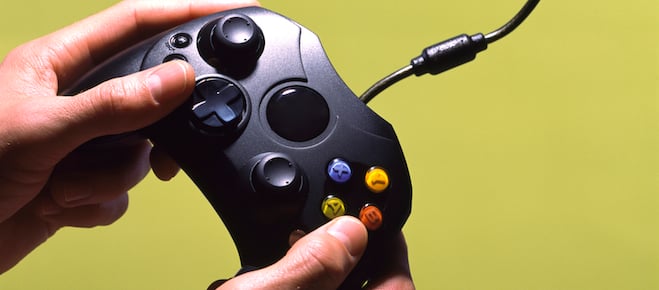Microsoft cements games lead, Apple joins the race
Who will be first to unify an operating system for computers, smartphones, tablets and TVs?
Hands using video game controller
Share

It’s not much of a stretch to predict that we’re going to see some new video game consoles this year. It might be a little surprising, however, to suggest that Microsoft is going to jump to a commanding lead in this ongoing console war and that the battle may go from the current three players to four–at least for the time being.
The writing on the wall couldn’t be more obvious in regards to new consoles, at least from Microsoft and likely from Sony as well. Slowing console sales are one indicator, but perhaps the most telling hint is Microsoft’s first-party release schedule.
The company has typically rotated its two biggest franchises, Halo and Gears of War, over successive holiday periods, with the former coming one year and the latter the next. Yet this time around, Halo 4 saw its release this past September while Gears of War: Judgment is scheduled for a March, 2013 launch. The two biggest franchises released within months of each other? What’s going on?
What big game does Microsoft have left for the holiday 2013 season? Could it be something new?
It’s going to have to be. Wouldn’t it be a hoot if Bungie, the developer that effectively launched the first Xbox with the inaugural Halo game, was working on a flagship title for the new console? That’s pure speculation, of course.
But given all that, why would Microsoft jump to a lead? Well, to start with, the Xbox 360 already holds a few advantages over rivals, including a more advanced online store and gaming, plus its Smartglass second-screen app that holds a world of potential. Kinect, for all its flaws, is also a far better motion gaming system than either of its rivals. Second-generation technology will doubtlessly make it even more impressive.
Microsoft’s real advantage over Sony and Nintendo, however, comes down to a simple concept: ecosystem. As in Microsoft has one, while its rivals do not.
The software giant has correctly identified a unified operating system as the current Holy Grail of technology. With computing now happening on computers, smartphones and tablets, the company that can provide the smoothest and simplest experience for apps across that range is going to be very popular with developers. And where developers go, consumers follow.
The major operating system makers, including Google and Apple, are striving toward this ideal. While Microsoft’s Windows 8 hasn’t exactly caught fire yet, it is the closest effort so far in achieving it.
Now add the fourth screen–the television–to the equation. Television makers including Samsung and LG have tried to create “smart” displays, but for the most part the results have been lackluster, which means the field is ripe for someone who can do it right. And if that someone can bring that unified experience from computers, phones and tablets–with all those app developers in tow–that’s even better.
Microsoft has been working towards this convergence for years, with the Xbox interface slowly morphing into the Windows 8 interface (or is it vice versa?). The company is trying to create a single environment for developers, wherein they can create apps and games that can go out to four screens with a minimum amount of additional work needed to tailor to specific categories of devices. And, to some extent, Microsoft is succeeding.
Sony and Nintendo, not being software experts, simply aren’t positioned for this kind of convergence. There is, in fact, only one other player that is: Apple.
Apple isn’t as far along in unifying its operating systems as Microsoft, but it too is inching in that direction. Apple’s big advantage, however, is that it already has a huge ecosystem of app developers who are finding it relatively easy to create across its slate of devices.
Most estimates figure that a good chunk–up to 75 per cent–of the money Apple makes through its app store is thanks to games. Combine that with the long-simmering quote from the departed Steve Jobs about how he had “finally cracked” how to do television and it seems like a no-brainer that the company will eventually enter the market for home games.
Whether this is done through a set-top box like a new-and-improved Apple TV, or through a full-blown Apple flat panel itself, is almost irrelevant, because it makes all kind of sense regardless of how it’s done. However it is done, my money is on it happening this year, for reasons explained in my separate predictions on Apple.
This would be the worst news for Nintendo, which has already lost plenty of its portable gaming business to Apple and its iPhones and iPads. While tablet and smartphone games generally can’t match the quality of dedicated devices, such as the Nintendo 3DS, many gamers are finding it more economical and equally satisfying to play something simple, like Angry Birds, on the subway for a few dollars, rather than shelling out $40 for a full portable game.
That same trend would likely replicate itself on television, where Apple could chew up much of the casual gaming audience that is Nintendo’s bread and butter.
And where does all of this leave Sony? Given the company’s reliance on Android in tablets and smartphones, it wouldn’t be surprising to see it develop even closer ties to Google in order to make up for its ecosystem shortfall. Could the PlayStation 4 run on Android? Don’t bet against it.